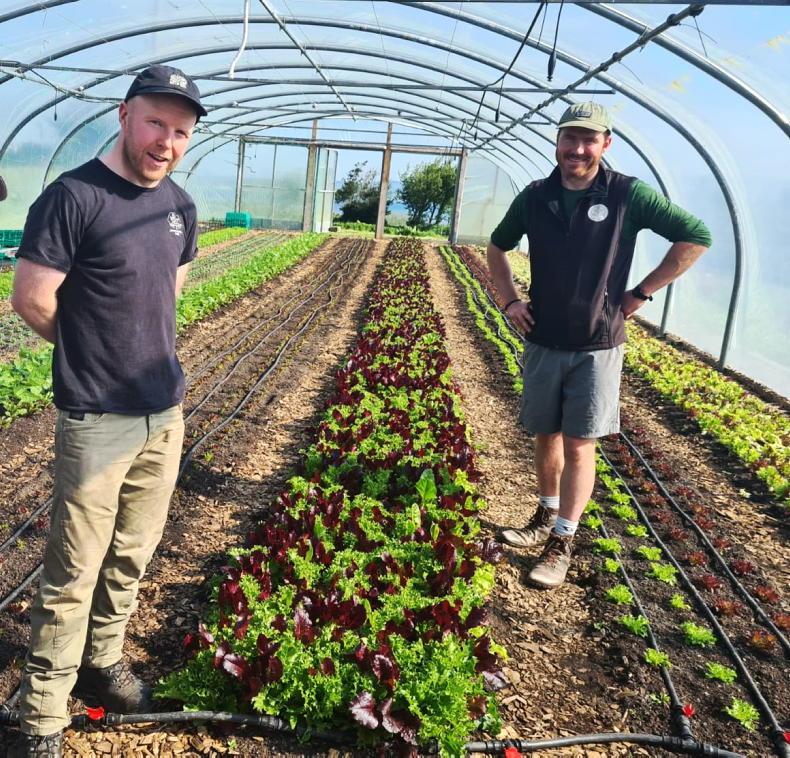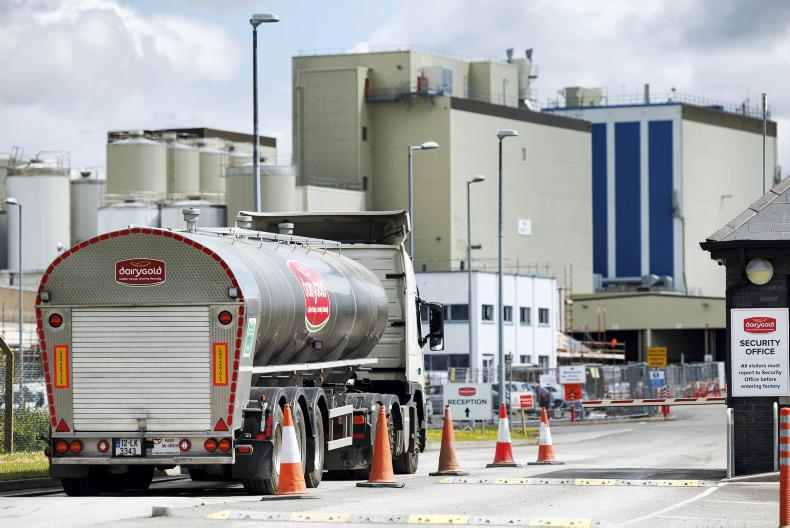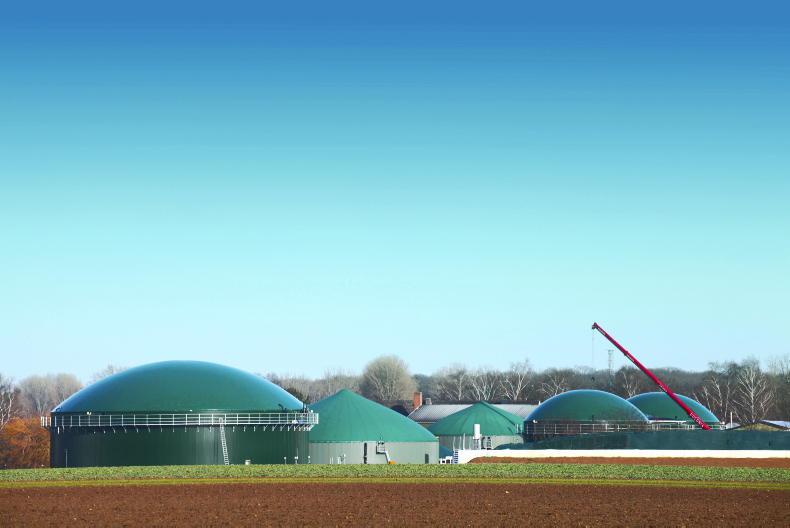The new ‘State of the Environment Report 2024’ produced by the EPA makes for a lengthy, but fascinating and sobering, read. Produced every four years, the report reviews Ireland’s progress on meeting targets across environmental parameters – air, water, soils, nature and climate – and across key sectors – transport, energy, industry and agriculture.
It culminates in a colour-coded national environmental scorecard, distilling the vast amount of data into a simple, incontrovertible conclusion: simply, that while our environmental ambitions are high, our delivery is poor.
It calls for transformational ‘systems change’, echoing the Food Vision 2030 report which proposes an ‘Integrated Food Systems’ approach.

Sean and Rob with their herd of belted Galloway cattle.
But what does this look like when applied to farming? To find out, I visited Knocknarea Farm near Strandhill, where ‘systems change’ has moved from an abstract concept to an actual farm enterprise.
College pals
Seán Gilligan and Rob Kennedy are rightly proud of the fact that they can support two young families on Knocknarea Farm’s 10ha. The change from the previous generation - when Seán’s father Patrick worked off-farm to supplement the income from his seven suckler cows - is truly transformational. Not least when you consider they receive no Government support and have built a thriving business over four short years.
Seán and Rob were college friends in Galway. They had big dreams – particularly around sustainable food production, inspired in part by a ‘holistic land management’ course they did with the Savory Institute. After college, Rob worked as a biomedical engineer, and Seán as a farm manager in New Zealand. Then, in 2020, they decided to combine forces and talents to revisit their dreams, prompted in part by Seán’s father, then retiring, agreeing to lease the farm to them.
Combining talents
The pair’s combined farming, business and engineering acumen was soon put to good use. The early business focused on ensuring good cash flow, so crops (initially veg and eggs) with quick returns were chosen, and profits reinvested. The engineering skills came in handy when erecting four second-hand polytunnels and building an ingenious mobile chicken coop.
To market the produce, they focussed on direct sales, minimising food miles by selling locally. A simple farm stall – on the busy Strandhill road – proved to be a hit, as did a local veg box scheme and sales to local shops. Today the Knocknarea Farm shop occupies a converted stable where customers, on an ‘honesty’ basis, can tap their card to pay for food, with prices clearly listed overhead.
They produce – 300 pasture-raised eggs daily in summer, plus a wide range of salads and veg, complemented by produce from other select suppliers – which often sells out; 80% of sales now come through the shop, with other local shops and restaurants accounting for the balance.
The next step for Seán and Rob was beef production – a smart way to expand their customer offering, utilising the farm’s ample grasslands and to generate nutrients for the market garden enterprise. The cattle, 10-12 hardy Galloways, need no housing and follow a holistic planned ‘mob-grazing’ system, moved rapidly between temporary plots. Demand for this pasture-fed beef is growing, so adjacent pastures are being rented in.
Valuable habitat
Nature is highly valued at Knocknarea Farm. Field margins host a variety of (2,000) trees – providing valuable habitat and shelter for livestock. The one-acre market garden has a wonderful 400m mixed-species shelterbelt, with cover crops (a 15-species mix) used to build soil fertility, and a pollinator garden to improve crop pollination.
The ‘circular economy’ is another popular concept being realised at Knocknarea – seaweed from local baths is combined with fish shells, animal manure and excess produce to generate a home-grown compost ‘alive’ with earthworms. While organic feed is bought for the chickens (sold for meat after a year of laying), the farm isn’t certified organic.

Seán and Rob were college friends in Galway.
Burning bright, not burning out
Knocknarea is a beautiful farm, with nature and community at its core. The farm is openly shared with customers, tour groups and local schoolchildren out to learn where their food comes from. As a ‘farm startup’ it is exceptional, achieving great success over a short time. But this can, of course, bring a lot of pressure and stress.
At Knocknarea Farm, the workload (and enthusiasm) is shared by both business partners and they each separately take a month off over winter. This is critical to recharge the batteries and avoid burnout. They ultimately plan to work a five-day week and have recently taken on their first employee.
The last line of the EPA report concludes that ‘we need to seek to be a generation that changes the path we are on and delivers an Ireland where our major environmental challenges have been solved’.
Fair play to Seán and Rob for being that generational change, for making ‘systems change’ manifest, and for feeding, informing and inspiring so many of us in the process. Knocknareafarm.com
Learn More
The EPA report – well worth a read – available for (free), download at epa.ie/publications or scan the QR code
Top Tips
Tip Tips
“Don’t be afraid to jump in front of a camera - direct selling and using social media to engage customers is critical”. Also, learn from others: Seán and Rob received “endless support” from peers at Heatherhill, Glasrai, Moyhill and Ridgedale farms, among others.
Farm facts
Name: Seán Gilligan and Rob Kennedy.Farm type: Veg, eggs, beef and poultry. Farm size: 10ha owned, 10ha rented.Focus: To connect the local community with how food is grown.Schemes: None
The new ‘State of the Environment Report 2024’ produced by the EPA makes for a lengthy, but fascinating and sobering, read. Produced every four years, the report reviews Ireland’s progress on meeting targets across environmental parameters – air, water, soils, nature and climate – and across key sectors – transport, energy, industry and agriculture.
It culminates in a colour-coded national environmental scorecard, distilling the vast amount of data into a simple, incontrovertible conclusion: simply, that while our environmental ambitions are high, our delivery is poor.
It calls for transformational ‘systems change’, echoing the Food Vision 2030 report which proposes an ‘Integrated Food Systems’ approach.

Sean and Rob with their herd of belted Galloway cattle.
But what does this look like when applied to farming? To find out, I visited Knocknarea Farm near Strandhill, where ‘systems change’ has moved from an abstract concept to an actual farm enterprise.
College pals
Seán Gilligan and Rob Kennedy are rightly proud of the fact that they can support two young families on Knocknarea Farm’s 10ha. The change from the previous generation - when Seán’s father Patrick worked off-farm to supplement the income from his seven suckler cows - is truly transformational. Not least when you consider they receive no Government support and have built a thriving business over four short years.
Seán and Rob were college friends in Galway. They had big dreams – particularly around sustainable food production, inspired in part by a ‘holistic land management’ course they did with the Savory Institute. After college, Rob worked as a biomedical engineer, and Seán as a farm manager in New Zealand. Then, in 2020, they decided to combine forces and talents to revisit their dreams, prompted in part by Seán’s father, then retiring, agreeing to lease the farm to them.
Combining talents
The pair’s combined farming, business and engineering acumen was soon put to good use. The early business focused on ensuring good cash flow, so crops (initially veg and eggs) with quick returns were chosen, and profits reinvested. The engineering skills came in handy when erecting four second-hand polytunnels and building an ingenious mobile chicken coop.
To market the produce, they focussed on direct sales, minimising food miles by selling locally. A simple farm stall – on the busy Strandhill road – proved to be a hit, as did a local veg box scheme and sales to local shops. Today the Knocknarea Farm shop occupies a converted stable where customers, on an ‘honesty’ basis, can tap their card to pay for food, with prices clearly listed overhead.
They produce – 300 pasture-raised eggs daily in summer, plus a wide range of salads and veg, complemented by produce from other select suppliers – which often sells out; 80% of sales now come through the shop, with other local shops and restaurants accounting for the balance.
The next step for Seán and Rob was beef production – a smart way to expand their customer offering, utilising the farm’s ample grasslands and to generate nutrients for the market garden enterprise. The cattle, 10-12 hardy Galloways, need no housing and follow a holistic planned ‘mob-grazing’ system, moved rapidly between temporary plots. Demand for this pasture-fed beef is growing, so adjacent pastures are being rented in.
Valuable habitat
Nature is highly valued at Knocknarea Farm. Field margins host a variety of (2,000) trees – providing valuable habitat and shelter for livestock. The one-acre market garden has a wonderful 400m mixed-species shelterbelt, with cover crops (a 15-species mix) used to build soil fertility, and a pollinator garden to improve crop pollination.
The ‘circular economy’ is another popular concept being realised at Knocknarea – seaweed from local baths is combined with fish shells, animal manure and excess produce to generate a home-grown compost ‘alive’ with earthworms. While organic feed is bought for the chickens (sold for meat after a year of laying), the farm isn’t certified organic.

Seán and Rob were college friends in Galway.
Burning bright, not burning out
Knocknarea is a beautiful farm, with nature and community at its core. The farm is openly shared with customers, tour groups and local schoolchildren out to learn where their food comes from. As a ‘farm startup’ it is exceptional, achieving great success over a short time. But this can, of course, bring a lot of pressure and stress.
At Knocknarea Farm, the workload (and enthusiasm) is shared by both business partners and they each separately take a month off over winter. This is critical to recharge the batteries and avoid burnout. They ultimately plan to work a five-day week and have recently taken on their first employee.
The last line of the EPA report concludes that ‘we need to seek to be a generation that changes the path we are on and delivers an Ireland where our major environmental challenges have been solved’.
Fair play to Seán and Rob for being that generational change, for making ‘systems change’ manifest, and for feeding, informing and inspiring so many of us in the process. Knocknareafarm.com
Learn More
The EPA report – well worth a read – available for (free), download at epa.ie/publications or scan the QR code
Top Tips
Tip Tips
“Don’t be afraid to jump in front of a camera - direct selling and using social media to engage customers is critical”. Also, learn from others: Seán and Rob received “endless support” from peers at Heatherhill, Glasrai, Moyhill and Ridgedale farms, among others.
Farm facts
Name: Seán Gilligan and Rob Kennedy.Farm type: Veg, eggs, beef and poultry. Farm size: 10ha owned, 10ha rented.Focus: To connect the local community with how food is grown.Schemes: None 











SHARING OPTIONS